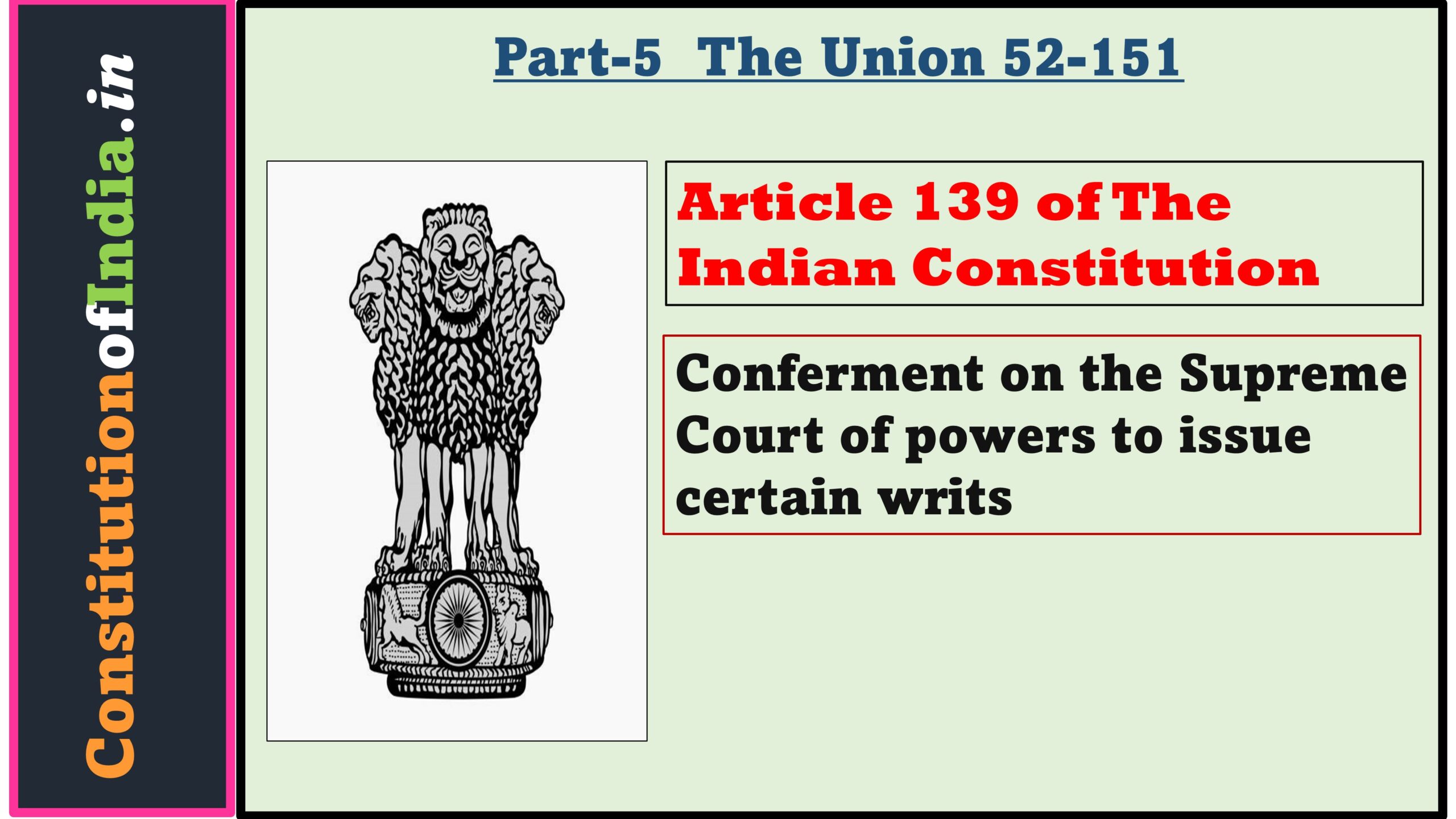Article 139 of Indian Constitution: Conferment on the Supreme Court of powers to issue certain writs.

Article 139 Conferment on the Supreme Court of powers to issue certain writs – Constitution Of India
Parliament may by law confer on the Supreme Court power to issue directions, orders or writs, including writs in the nature of habeas corpus, mandamus, prohibition, quo warranto and certiorari, or any of them, for any purposes other than those mentioned in clause (2) of article 32.
Article 139A (1) Where cases involving the same or substantially the same questions of law are pending before the Supreme Court and one or more High Courts or before two or more High Courts and the Supreme Court is satisfied on its own motion or on an application made by the Attorney-General of India or by a party to any such case that such questions are substantial questions of general importance, the Supreme Court may withdraw the case or cases pending before the High Court or the High Courts and dispose of all the cases itself: Provided that the Supreme Court may after determining the said questions of law return any case so withdrawn together with a copy of its judgment on such questions to the High Court from which the case has been withdrawn, and the High Court shall on receipt thereof, proceed to dispose of the case in conformity with such judgment.
(2) The Supreme Court may, if it deems it expedient so to do for the ends of justice, transfer any case, appeal or other proceedings pending before any High Court to any other High Court.
Here is a summary of Article 139 and Article 139A of the Constitution of India:
🔹 Article 139 – Conferment on the Supreme Court of Powers to Issue Certain Writs
Text Summary:
- Parliament may pass a law to empower the Supreme Court to issue writs (directions, orders, etc.) like:
- Habeas Corpus
- Mandamus
- Prohibition
- Certiorari
- Quo Warranto
- This power would be for purposes other than those under Article 32(2) (which deals with the Supreme Court’s power to enforce fundamental rights).
✅ Key Point:
- While Article 32 gives the Supreme Court power to issue writs only for enforcement of Fundamental Rights, Article 139 allows Parliament to extend writ powers to other legal purposes.
🔹 Article 139A – Transfer of Certain Cases
Clause (1): Transfer Based on Common Legal Questions
- If identical or similar questions of law arise in multiple cases pending in the Supreme Court and one or more High Courts, or in two or more High Courts, and:
- The Supreme Court finds the question substantially important, and
- The case involves a substantial question of general importance,
- Then, the Supreme Court can:
- Withdraw the case(s) from the High Court(s).
- Decide them itself.
- After deciding, the Court can return the case to the High Court with its judgment for disposal in line with that judgment.
Clause (2): Transfer Between High Courts
- The Supreme Court can transfer any case, appeal, or proceeding from one High Court to another, in the interest of justice.
🧾 Comparison Chart
| Feature | Article 139 | Article 139A |
|---|---|---|
| Focus | Issuance of writs by the Supreme Court | Transfer or withdrawal of cases involving similar legal questions |
| Who enacts | Parliament enacts law to empower Supreme Court | Power lies directly with the Supreme Court |
| Writ Purpose | For purposes other than fundamental rights | Not about writs, but about case management and consolidation |
| Transfer Provision | ❌ (Not applicable) | ✅ Supreme Court can transfer cases between High Courts or withdraw them to decide itself |
| Trigger | Parliament’s law | Motion by SC itself, Attorney General, or a party |
⚖️ Significance:
- Article 139 helps expand the writ jurisdiction of the Supreme Court beyond fundamental rights.
- Article 139A enhances judicial efficiency and consistency by centralizing decisions on important constitutional or legal questions.
- Promotes uniform interpretation of laws and helps in reducing contradictory rulings by different High Courts.